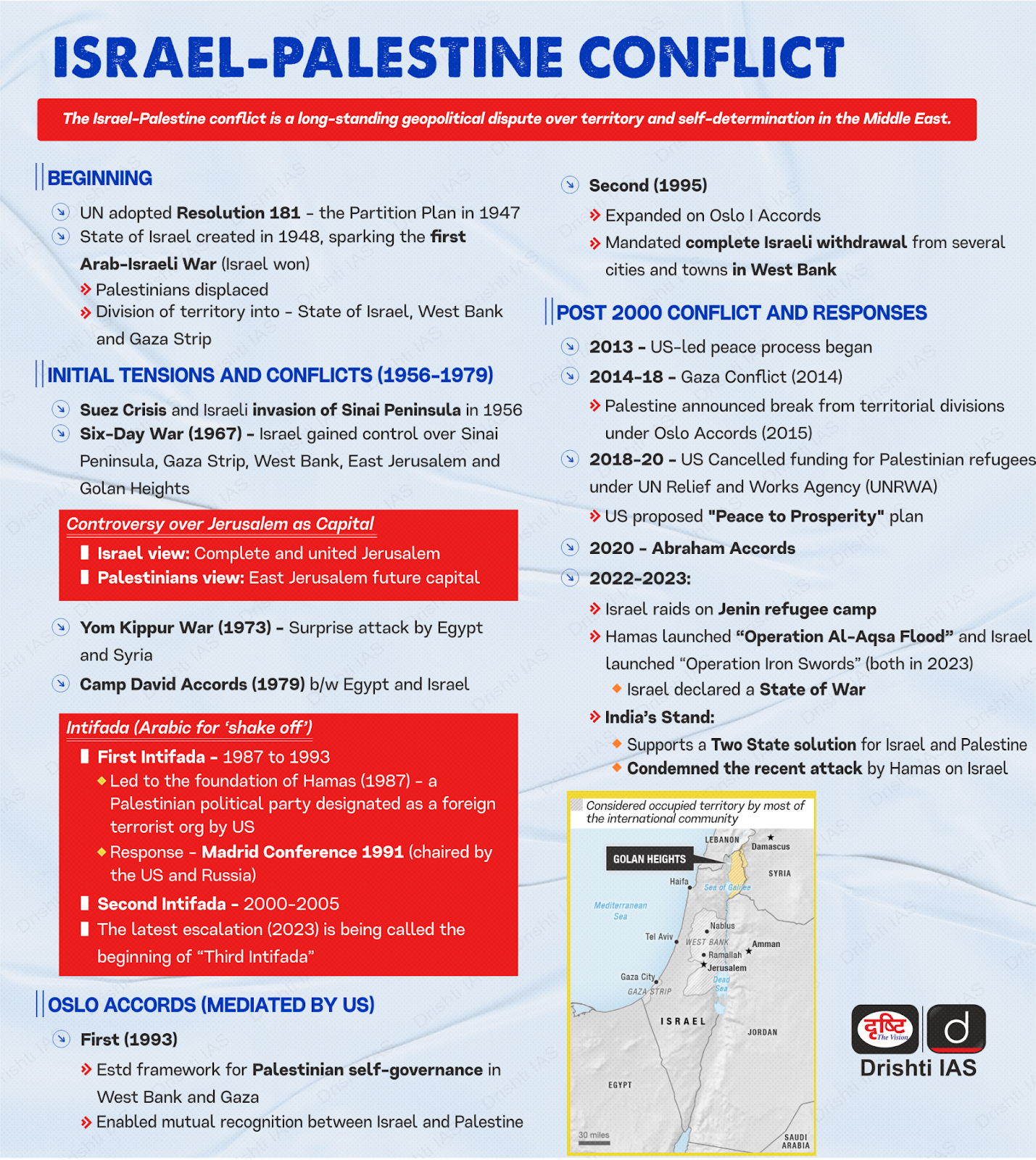International Relations
Gandhi's Stance on Jewish Nation-State in Palestine
- 16 Oct 2023
- 7 min read
For Prelims: Mahatma Gandhi, Israel-Palestine Conflict, Balfour Declaration
For Mains: Effect of Policies & Politics of Countries on India's Interests, India’s stand and Solution to the Israel-Palestine conflict
Why in News?
The opposition of Mahatma Gandhi to a Jewish nation-state in Palestine has gained renewed attention because of ongoing conflict and tensions between Israel and Palestine.
Why did Gandhi Oppose a Jewish Nation-State in Palestine?
- The Plight of the Jewish People in Europe:
- In the 1930s and 1940s, the Jewish people in Europe faced extreme persecution and discrimination, particularly under the Nazi regime led by Adolf Hitler.
- The Nazis systematically implemented the Holocaust, resulting in the tragic loss of approximately six million Jewish lives, along with numerous other atrocities such as concentration camps, and mass deportations.
- In the 1930s and 1940s, the Jewish people in Europe faced extreme persecution and discrimination, particularly under the Nazi regime led by Adolf Hitler.
- Gandhi's Sympathy for the Jewish People:
- Gandhi had immense sympathy for the Jewish people who had been historically persecuted for their religion.
- He drew parallels between the treatment of Jews in Europe and that of untouchables in India, emphasizing the inhumane treatment meted out to both communities.
- Gandhi was deeply concerned about the German persecution of Jews and believed that even a war with Germany would be justified to prevent such persecution.
- Gandhi had immense sympathy for the Jewish people who had been historically persecuted for their religion.
- The Zionist Movement and Its Goals:
- The Zionist movement emerged in the late 19th century, with a goal to establish a national homeland for Jewish people in Palestine.
- Its momentum increased significantly after World War I, encouraged by the Balfour Declaration of 1917, which expressed support for a Jewish national home in Palestine.
- After World War II, in 1947, the United Nations proposed a partition plan that would divide Palestine into separate Jewish and Arab states, with Jerusalem as an international city.
- The plan was accepted by the Jewish leaders but rejected by Arab leaders, leading to violence.
- Israel was officially declared an independent state on May 14, 1948.
- Gandhi's Opposition to a Jewish Nation-State:
- Gandhi opposed a Jewish nation-state in Palestine, deeming it wrong and inhumane. He believed it would be a crime against humanity to displace the native Arab population for the establishment of a Jewish homeland.
- Gandhi felt that the Jews could settle in Palestine only “with the goodwill of Arabs”, and for that, they had to “forgo the British bayonet”.
- He believed that any religious act, such as Jews returning to Palestine, should not be enforced with the bayonet or bomb but should occur with the goodwill of Arabs.
- Gandhi believed that the concept of a Jewish homeland in Palestine contradicted the fight for Jewish rights worldwide. He questioned whether Jews, who had already settled in various parts of the world, would welcome the idea of being forced to leave those other regions if Palestine was their sole home.
- Gandhi opposed a Jewish nation-state in Palestine, deeming it wrong and inhumane. He believed it would be a crime against humanity to displace the native Arab population for the establishment of a Jewish homeland.
How did Gandhi's Stance Influence India's Israel-Palestine Policy?
- Gandhi’s opinions and his own anti-imperialism had a profound impact on Jawaharlal Nehru, India’s first Prime Minister, and was responsible for shaping the nascent country’s foreign policy for decades, leading to India's vote against UN Resolution 181 partitioning Palestine.
- India recognized the state of Israel in 1950 but established official diplomatic relations in 1992, under Prime Minister P V Narasimha Rao.
- India was among the first non-Arab nations to acknowledge the Palestine Liberation Organization (PLO) as the sole Palestinian representative. In 1988, India recognized Palestine as a state.
- However, India’s policy also underwent some changes over time, reflecting its strategic and economic interests.
- Recently, India has shifted towards a dehyphenation policy, balancing its relationships with both Israel and Palestine, with a preference for a Two-State Solution and the right to self-determination for both nations in a peaceful manner.
UPSC Civil Services Examination, Previous Year Questions (PYQs)
Prelims
Q1. Consider the following statements: (2023)
Statement-I: Israel has established diplomatic relations with some Arab States.
Statement-II: The ‘Arab Peace Initiative’ mediated by Saudi Arabia was signed by Israel and Arab League.
Which one of the following is correct in respect of the above statements?
(a) Both Statement-I and Statement-II are correct, and Statement-II is the correct explanation for Statement-I
(b) Both Statement-I and Statement-II are correct, and Statement-II is not the correct explanation for Statement-I
(c) Statement-I is correct, but Statement-II is incorrect
(d) Statement-I is incorrect, but Statement-II is correct
Ans: (c)
Q2. The term “two-state solution” is sometimes mentioned in the news in the context of the affairs of (2018)
(a) China
(b) Israel
(c) Iraq
(d) Yemen
Ans: (b)
Mains
Q. ‘Too little cash, too much politics, leaves UNESCO fighting for life.’ Discuss the statement in the light of US’ withdrawal and its accusation of the cultural body as being ‘anti-Israel bias’. (2019)
Q. “India’s relations with Israel have, of late, acquired a depth and diversity, which cannot be rolled back.” Discuss. (2018)







